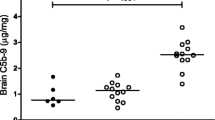Abstract
Permanent neurologic disabilities are seen in up to a quarter of survivors of bacterial meningitis despite major improvements in therapy. Experimental studies have demonstrated that most of the pathology in meningitis is mediated by inflammatory cytokines such as tumor necrosis factor (TNF) and interleukin-1 (IL-1), which are produced by host cells in response to bacterial invasion of the meninges. Dexamethasone has been used in a number of clinical trials to moderate the host response and to improve neurologic outcome of meningitis. Results of six randomized, placebo controlled trials are summarized in this review. Dexamethasone treatment did not lower mortality. Only a moderate, but not a significant reduction in the neurologic and audiologic sequelae was seen in dexamethasone recipients whenHaemophilus influenzae type b (Hib) was the causative agent of meningitis. Following routine use of Hib vaccine, meningitis caused by this agent has virtually disappeared in the USA. Hence, findings from these trials may no longer be applicable in countries with high rates of immunization against Hib. Presently, there is little or no evidence showing a benefit of dexamethasone therapy in meningitis caused byS. pneumoniae orN. meningitidis. Global emergence of penicillin and cephalosporin resistantS. pneumoniae has raised new concerns about the use of dexamethasone in pneumococcal meningitis. Since dexamethasone significantly decreases the penetration and concentration of vancomycin and ceftriaxone in the CSF and delays CSF sterilization, adjunctive dexamethasone therapy may increase the risk of treatment failure in meningitis caused by antibiotic resistant pneumococci. An antibiotic combination should be used in the treatment of meningitis caused by antibiotic resistant pneumococci, particularly if dexamethasone is also being administered concurrently.
Similar content being viewed by others
References
Taylor HG, Michaels RH, Mazur PMet al. Intellectual neuropsychological, and achievement outcomes in children six to eight years after recovery from Haemophilus influenzae meningitis.Pediatrics 1984; 74: 198–205.
Quagliarello V, and Scheid WMet al. Bacterial meningitis: pathogenesis, pathophysiology, and progress.N Eng J Med 1992; 327: 864–872.
Kalpan SL, Hawkins EP, Kline MWet al. Invasion of the inner ear by Haemophilus influenzae type b in experimental meningitis. JInfect Dis 1989; 159: 923–930.
Mustafa MM, Ramilo O, Mertsola Jet al. Modulation of inflammation and cachectin activity in relation to treatment of experimental Haemophilus influenzae type b meningitis.J Infect Dis 1989; 160: 818–825.
Prober CG. The role of steroids in the management of children with bacterial meningitis.Pediatrics 1995; 95: 29–31.
Lebel MH, Freij BJ, Syrogiannopoulos GAet al. Dexamethasone therapy for bacterial meningitis: results of two double-blind, placebo-controlled trials.N Engl J Med 1988; 319: 964–971.
Odio CM, Faingezicht I, Paris Met al. The beneficial effects of early dexamethasone administration in infants and children with bacterial meningitis.N Engl J Med 1991;324: 1525–1531.
Schaad UB, Lips U, Gnehm HEet al. Dexamethasone therapy for bacterial meningitis in children.Lancet 1993; 342: 457–461.
King SM, Law B, Langley JMel al. Dexamethasone therapy for bacterial meningitis. Better never than late?,Can J Infect Dis 1994; 5: 210–215.
Wald ER, Kaplan SL, Mason EOet al. Dexamethasone therapy for children with bacterial meningitis.Pediatrics 1995; 95: 21–28.
Schaad UB, Suter 5, Gianella-Borradori Aet al. A comparison of ceftriaxone and cefuroxime for the treatment of bacterial meningitis in children. NEngl J Med 1990; 322: 141–147.
Adams WG, Deaver KA, Cochi SLet al. Decline of childhood Haemophilus influenzae type b (Hib) disease in the Hib vaccine era.JAMA 1993; 269: 221–226.
Girgis NI, Zoheir F, Mikhail IAet al. Dexamethasone treatment for bacterial meningitis in children and adults.Ped Inf Dis J 1989; 8: 848–851.
Kennedy WA, Hoyt MJ, McCracken GH Jr. The role of corticosteroid therapy in childrenwith pneumococcal meningitisAm J Dis Child 1991; 145: 1374–1378.
Kanra GY, Ozen H, Secmeer G, Ceyhan M, Ecevit Z, Belgin E. Beneficial effects of dexamethasone in children with pneumocccal meningitis.Ped Inf Dis J 1995; 14: 490–494.
Paris MM, Ramilo O, McCracken GH Jr. Management of meningitis caused by penicillin-resistant streptococcus pneumoniae.Antimicrob Agents Chemother 1995; 39: 2171–2175.
Report of the Committee of Infectious Diseases of the American Academy of Pediatrics. 23rd Ed. Dexamethasone therapy for bacterial meningitis in infants and children. Elk Grove Village, II: American Academy of Pediatrics; 1994; 558–559.
Author information
Authors and Affiliations
Rights and permissions
About this article
Cite this article
Kaul, A., Chandwani, S. Dexamethasone in bacterial meningitis: To use or not to use?. Indian J Pediatr 63, 583–589 (1996). https://doi.org/10.1007/BF02730800
Issue Date:
DOI: https://doi.org/10.1007/BF02730800




